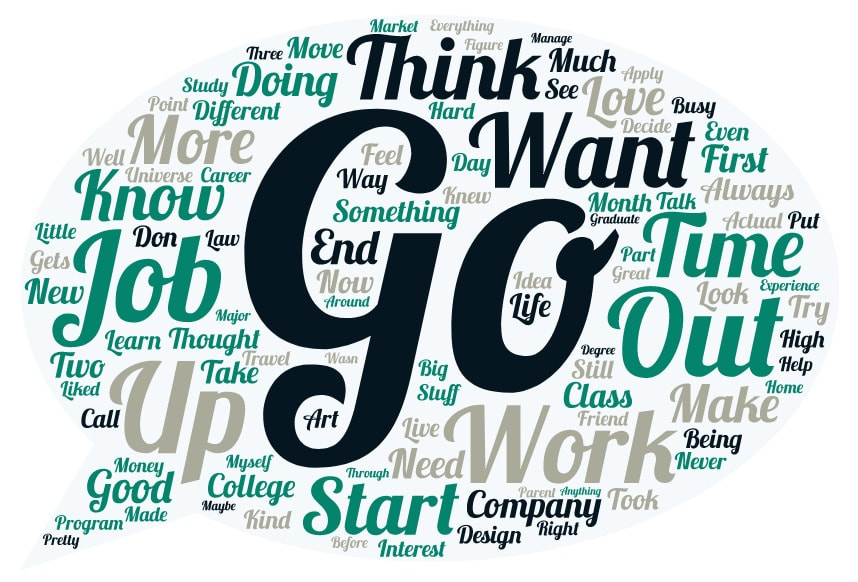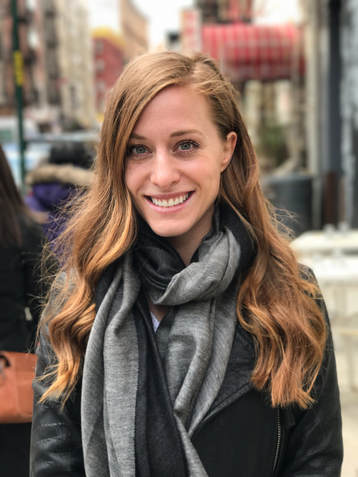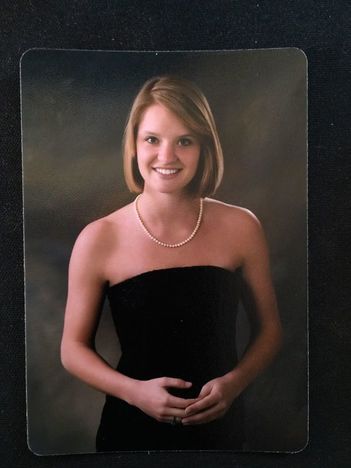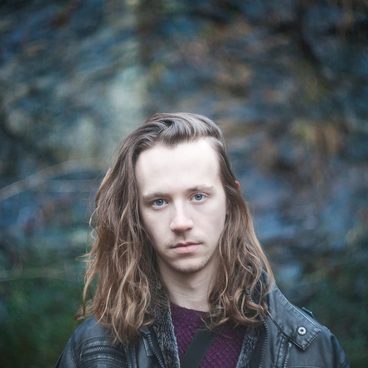 One of the things I’ve always loved to do is make connections between different things. It’s one of the reasons I thrived in a liberal arts environment; connecting history to literature to philosophy to psychology to science is the whole point of an interdisciplinary education. In the same way that I lit up in college at the parallel revenge cycles in Beowulf and Aeschylus’s Oresteia, I’ve thrilled at the many points of connection in the interviews I’ve been doing for the “When I Was 17” project. Beyond the consistency in people stories, how many of my subjects didn’t know what they wanted to study when they went to college, yet still found their way to compelling jobs and careers, I was curious to see the consistency in the language people have used to tell their stories. To get a better sense of this, I put together a word cloud of the most frequently used words in the series up to this point. Some of the results were obvious, words like “work” and “company” and “college.” But some of the words surprised me, and gave me a new sense of how people actually find their way to professional satisfaction. Go – I have to say, the most unexpected word to me was the largest one, “go.” But as I sat with it, I started to really appreciate this as a representation of all the stories in “When I Was 17.” There’s a thrilling sense of agency implied in the word go. It beautifully captures how much your professional and personal path is in your control. And more than that, getting somewhere satisfying is often less about knowing where you’re going, and more about just taking the next step. Just going. Want – The prominence of the word “want” in people’s interviews really brings to mind how large a role this word plays in my conversations with my students. Almost every conversation I have about summer plans, or next year’s classes, or college essays starts with the question, “What do you want?” What you want to study, how you want to spend your time, and what story you want to use to illustrate who you are are the things colleges care the most about. “What do you want?” is similar to asking what interests you, what excites you, and what are you going to do next. And that is the question colleges are really asking. Time – This is my favorite word in the word cloud, because time is so much more forgiving than most 17-year-olds believe it is. For every person who knew what they wanted to do right out of the gate, there are so many more who needed more time to figure it out. And most people don’t find their dream job on the first try; they spend time developing their skills and expertise and work their way toward a better a company, a better position, a better fit. Taking your time to experiment, to explore, and sometimes to fail is one of best ways to find a satisfying career.
0 Comments
 Kodak moment: taken on her very last day in New York before beginning her We Roam adventure Kodak moment: taken on her very last day in New York before beginning her We Roam adventure I first met Alex Martin on a street art tour in Buenos Aires, where she beautifully captured new Roamers getting to know each other and the first city we called home. Since then, she’s been traveling with each of We Roam’s three trips, running digital content and creative media, and visually telling the story of what it’s really like to travel while you work. Alex has quickly settled into her new job, and embraced the digital nomad lifestyle she spends each day sharing online. When you were 17, what did you want to be? Very easy question. When I was 17, I was training to be a ballet dancer. I grew up in Canada, and I started dancing when most little girls start, around three years old. I just stuck with it, and I always loved it. I was always dancing around my house. I was obsessed. It was the only thing that I wanted to do.  Senior portraits prove that black velvet and pearls really never go out of style. Senior portraits prove that black velvet and pearls really never go out of style. Abby Todd is a freelance marketing and graphic design professional. She also has a year’s worth of experience organizing and executing amazing events practically anywhere in the world, like the 30-person Thanksgiving feast she threw in Vietnam this year – and boot-strapped a dining room table for. With her year on We Roam coming to an end, Abby’s life is at a crossroads, and I know her next step will be just as authentic to who she is and where she excels as every step she’s taken before. Our conversation has been edited for length and clarity. When you were 17, what did you want to be? I feel like I've always wanted to be a lot of different things, I've never been able to pinpoint exactly one thing that I wanted to do. I did write all my college essays about how I wanted to be an engineer. I thought that I wanted to go into underdeveloped areas and help build their town and cities, so I thought civil engineering was my path.  In addition to music and business, Kyle is also a part-time photographer. In addition to music and business, Kyle is also a part-time photographer. Kyle Eroche is a musician, audio engineer, and budding entrepreneur. I met Kyle in Vietnam through my friend, and fellow Roamer, Thomas Dempsey. In Hanoi, Kyle was testing the waters of the remote work lifestyle, something that was becoming more and more appealing to him. Kyle is the perfect ambassador for the new direction this blog will take in 2018, away from the remote workers I've been traveling with this year, toward the broader range of professionals I connect with every day. Our conversation has been edited for length and clarity. When you were 17, what did you want to be? At that time I definitely wanted to play music. I had been playing music since I was 14 or 15, playing shows in New Orleans. I was young to do it at that time, but I just wanted to play. I was always scholastically involved, but I never had to put forth any effort in school, never. I was always doing extracurricular stuff; that was what I cared about, and I took a lot of pride in that. I found something that I was passionate about, and I only wanted to do what I cared about. My mom kind of lived in fear of that because she didn’t know if I could support myself. I rebelled against that a lot in my angsty teenage years. |
What is the When I Was 17 Project?When I Was 17 is a blog series dedicated to collecting the varied stories of people's career paths, what they envisioned themselves doing when they were teenagers and how that evolved over the course of their lives. I started this project with the goal of illustrating that it's okay not to know exactly what you want to do when you're 17; many successful people didn't, and these are a few of their stories.
Archives
October 2020
|